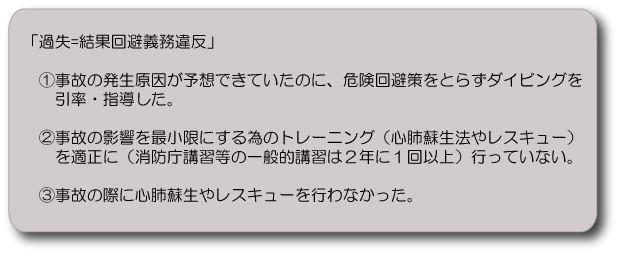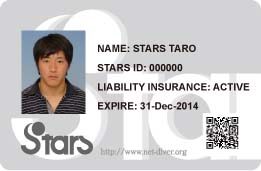
The Role of Dive Professionals
Certification Card
Conditions for Holding
Classroom Control
Gathering Information
Planning
Recruitment of Participants
Conducting Fun Dives①
Conducting Fun Dives②
Conducting Fun Dives③
Conducting Fun Dives④
Risk Management
Obligations and Responsibilities
|

|
|
In the event of a diving accident, dive professionals may bear civil and criminal liability.
Civil liability is the responsibility of a dive professional to compensate the victim for damages caused.
Criminal liability refers to the responsibility of a dive professional to be punished for crimes such as negligent homicide or injury committed in the course of their duties.
In civil and criminal trials, the question of whether the dive professional was negligent is deliberated.
Negligence can be categorized into "negligence by violation of the duty of foreseeability" and "negligence by violation of the duty to avoid the result."


Additionally, dive professionals are not held civilly or criminally liable for accidents caused by undisclosed guest conditions, as long as the guests did not disclose relevant information on the "Health Questionnaire" or the "Confirmation Form at the Start".
For example, in cases of diving accidents such as ventricular fibrillation (sudden death) or decompression sickness caused by the guest's personal health management, dive professionals are generally not held civilly or criminally liable.
|
■Civil liability
In civil trials, negligence can result in an obligation to compensate the victim for damages.
Liability insurance compensates for the civil liability of dive professionals, with the insurance company providing damages to the victims.
That is correct, it serves a similar role as voluntary automobile insurance (liability insurance).
When conducting diving courses or leading fun dives, it is important to confirm whether you are enrolled in the liability insurance prepared by STARS.
If you are not enrolled in the liability insurance prepared by STARS, dive professional activities are prohibited.
The dive professional's certification card includes the qualification's "EXPIRE" (expiration date) and "LIABILITY INSURANCE" with either "ACTIVE" (enrolled) or "NO ACTIVE" (not enrolled) printed on it.
Please note that compensation orders from courts outside Japan and damages resulting from accidents involving aircraft, ships, or vehicles are not covered by the liability insurance prepared by STARS.
When engaging in dive professional activities in foreign resort areas, there is a possibility of litigation in courts outside of Japan. Therefore, it is advisable to enroll in liability insurance prepared by insurance companies in the country where the instructor is conducting activities.
Additionally, ensure that the vessels used for boat diving and the vehicles used for transportation to diving sites are covered by boat insurance and automobile insurance, respectively.
|

Check "EXPIRE" and "ACTIVE". |
■
Criminal liability
During the interrogation, you may be asked by police officers, coast guard officers, and prosecutors to explain the circumstances of the accident and whether there was any negligence.
A testimony from a dive professional can serve as evidence in deciding whether to prosecute or not.
Additionally, if charged, this could be important evidence in a criminal trial, including determining guilt or innocence and sentencing, and could result in "negligence resulting in death or injury in the course of duty" leading to fines, imprisonment, or incarceration.
Please speak accurately about your own understanding to police officers, coast guard officers, and prosecutors. |
|
|
|
|
© net-diver school.2006.All rights reserved |
|

